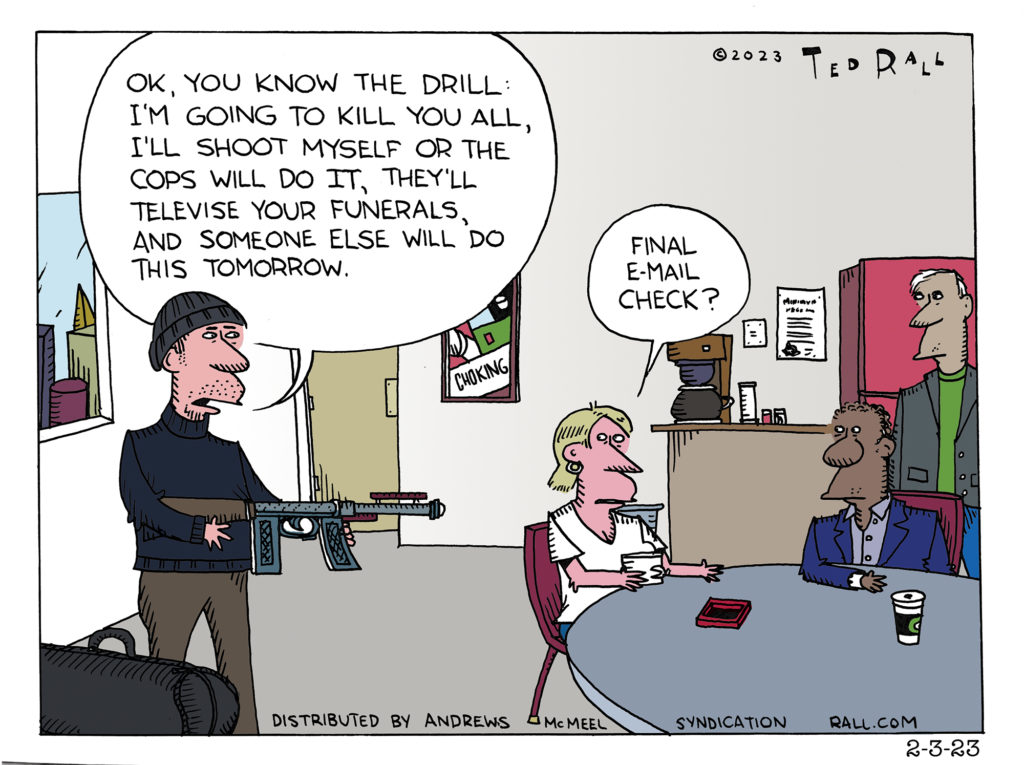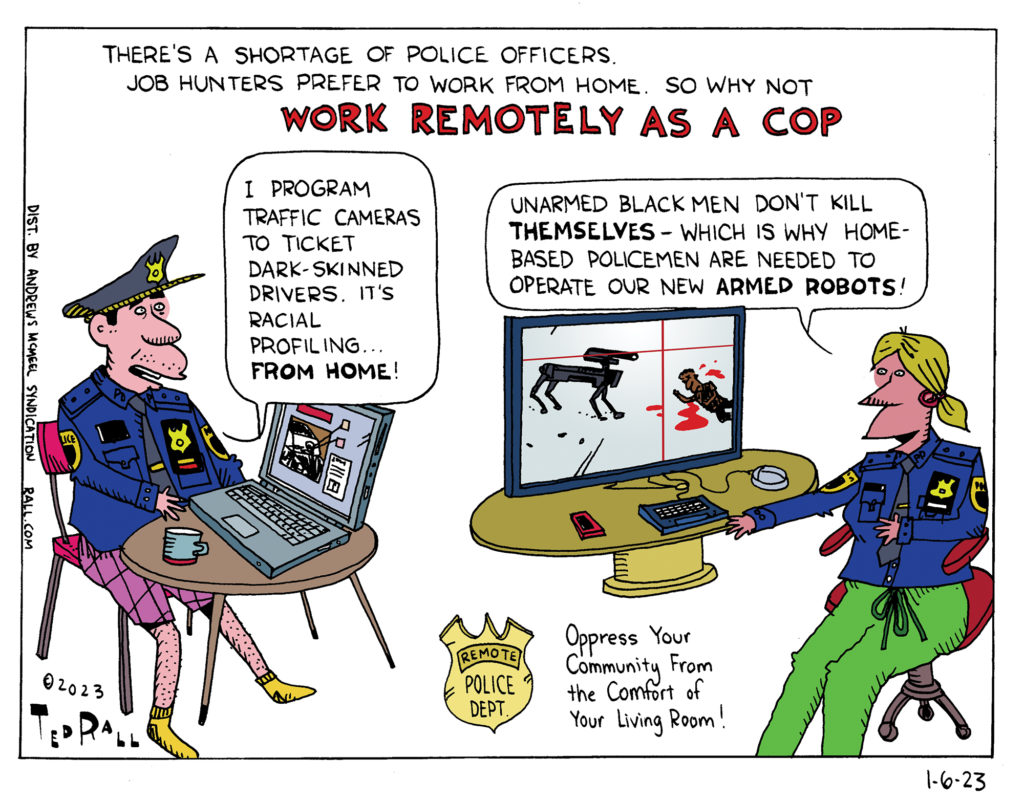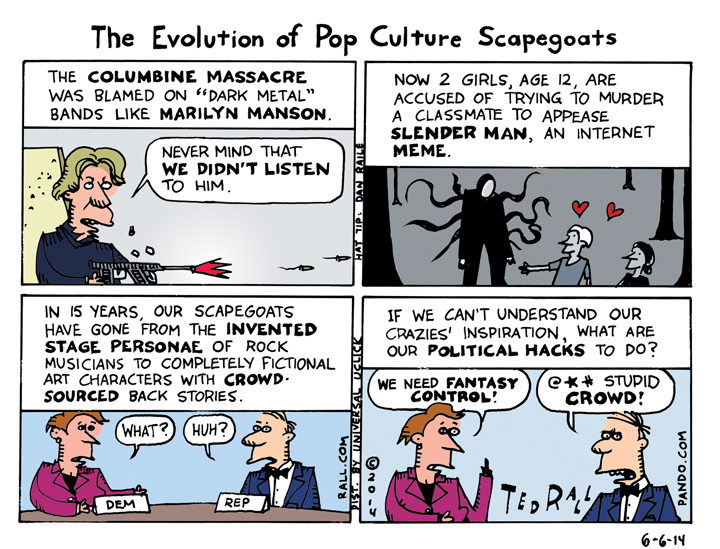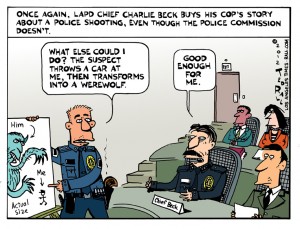Another week, another mass shooting. Well, actually a bunch of them in California, all at the same time. It’s very clear that the American political system has no motivation or ability or drive to do anything about this problem.
ANewDomain.net Essay: Cuba, North Korea, Cop Killers: As Conservative Tactics Fail
Originally published at ANewDomain.net:
Conservatives have been spoiled. For at least as long as I’ve been alive – I’m 51 – right-wingers have scarcely had to break a sweat in political debates. Until recently, all it has taken to reduce a liberal to a blubbering, conceding mess was a cheesy ad hominem attack.
You hate the troops!
You hate the cops!
Why do you hate America so much?
Though undeniably tentative and fragile, there are indications that the Right’s reign of terror in public discourse may come to an end someday.
A case in point is President Obama, whose first six years in office were characterized by relentless timidity even when he enjoyed amazing poll numbers and control of both houses of Congress. After the Democrats lost control of the House of Representatives in November 2014, he was expected to follow the liberal Democratic tradition of accepting that the Republicans should get their way on everything because that was obviously the will of the American people.
Instead, he inaugurated his lame-duck final couplet with aggressive moves on immigration reform and, last week, normalization of diplomatic relations with Cuba, both through executive action. Republicans howled – but nothing happened. To the contrary, Obama seems more powerful than ever.
Some sort of turning point in the ideological zeitgeist seems to have been reached with former Vice President Dick Cheney’s appearance on “Meet the Press” two weekends ago. Blisteringly belligerent as usual, Cheney didn’t even try to appeal to logic or reason while defending “enhanced interrogation techniques” under the Bush Administration in the wake of the Senate torture report.
“Torture, to me, Chuck, is an American citizen on a cell phone making a last call to his four young daughters shortly before he burns to death in the upper levels of the Trade Center in New York City on 9/11,” Cheney said.
For many years after September 11 attacks, this was the kind of off-the-cuff mindfart that progressives and Democrats didn’t know how to counter. (No, that’s not torture. That’s tragedy.) Anything that harkened back to 9/11, no matter how irrelevant or stupid, was rhetorical kryptonite to liberals who didn’t want to appear weak in the War on Terror.
Not this time. The Internet ate Cheney for lunch. And he was roundly ridiculed, not only on the cable TV satire shows, but by fellow Republicans.
Cheney caught the worst of it, but standard Republican talking points and rhetorical style took a beating over the last week on a number of issues.
Arizona Senator, Vietnam POW and 2008 presidential candidate John McCain reacted to the alleged hack of Sony Entertainment by the North Korean government in his standard bellicose way, declaring it “an act of war.” An act of war, naturally, calls for a military response. The declaration by President Bush that 9/11 was an act of war, for example, prompted Congress to authorize the invasion and occupation of Afghanistan by a nearly unanimous vote. (Which worked out splendidly!)
Interestingly, McCain’s ferocity fell largely upon deaf ears. More in touch with ordinary Americans was President Obama, who countered that the hackers had actually carried out “an act of cyber-vandalism that was very costly, very expensive.”
In a sneak preview of the 2016 GOP presidential primaries, likely contender and Florida Senator Marco Rubio catered to part of his Greater Miami constituency of Cuban exiles by calling for the continuation of the half-century-old trade blockade of the Caribbean island. “I don’t care if the polls say that 99% of people believe we should normalize relations in Cuba,” he said. It’s not quite that extreme yet, but most Americans do support Obama’s decision to recognize the end of the Cold War 23 years after the fact.
Rubio’s rhetoric was met with a yawn (and lucky for him). Obama’s actions are largely seen by the political class as a fait accompli, all over but the shouting at passport control in Havana.
This is a remarkable transformation. Twenty or even ten years ago, any Democrat who had endorsed, much less carried out, such a move would be deemed to have committed political suicide. Republican talk radio would have screamed that it was un-American, procommunist, and treasonous. Sure, they’re saying the same thing now, but no one cares because, well, it’s stupid.
Of course, it would have been stupid back then. The difference is, people can see that now.
Then, in New York City, there was Saturday’s shooting of two police officers as they sat in their patrol car in the Bedford Stuyvesant section of Brooklyn, apparently by a deranged man with a long criminal record. New York’s new mayor Bill de Blasio, a progressive Democrat whose political allies don’t include top NYPD figures, took a blast of heat from police union leaders, one of whom spat that de Blasio has blood on his hands. (Apparently he drew a straight line between the shooter’s post-Ferguson/post-Staten Island anti-cop rants on Instagram and the mayor’s revelation that he tells his biracial son to be careful when he encounters police officers.)
To be sure, de Blasio is having trouble with the NYPD — but this kerfuffle is nothing close to the existential crisis a liberal Democratic mayor in the same pickle would have had to endure just a few short years ago. Most New Yorkers recognize that this is police overreach. A few weeks after New Yorkers of all races reacted with disgust to a grand jury decision not to indict the Staten Island police officer who murdered Eric Garner on video, not even the cold-blooded assassination of two cops on the streets of Brooklyn erases that memory or allows a return to the Giuliani years, when cops could do no wrong in the eyes of officialdom. If the mayor tells his kid to watch out for the cops, who can blame him?
So what has changed?
It might be a bona fide political shift from right to left, but that’s not my take. What we are seeing, I suspect, is popular exhaustion with right-wing talking points and bullying rhetoric. There’s a certain point at which repetition stops working and becomes annoying – and it feels like that’s where we’re at.
In the future, if conservatives want to be taken seriously, they’re going to have to go back to the old William F. Buckley days and attempt to construct calm, logically reasoned arguments in favor of their ideas. Name-calling and appeals to rank emotionalism aren’t cutting it anymore.
SYNDICATED COLUMN: Gun Control Talk Is Cheap. A Sane Mental Health System Is Not.
Guess Which Policy Prescription We Hear After Shooting Sprees?
It is, unfortunately, necessary to state the obvious after America’s latest mass shooting in Colorado. Like: we don’t know why James Holmes, the 24-year-old suspect, shot up that movie theater. We don’t know his mental state. Given the legal presumption of innocence, we shouldn’t write with certainty that it was him.
Given how the 24-hour news cycle has expanded the American media’s love of speculation, however, the Batman Bloodbath became fodder for political policy prescriptions the moment the first round left the chamber of Holmes’ (or whomever’s) AR-15.
We saw it after Columbine, when conservatives blamed goth, video games and the so-called “trenchcoat mafia.” Liberals (me included) set their sights on bullying jocks. Both sides were wrong—Eric Harris and Dylan Klebold were probably mentally ill, simply victims of one or more not-so-simple personality disorders—yet the political debate ultimately prompted schools to adopt increased security measures and zero tolerance policies against bullying. State legislatures passed minor gun control laws.
Which may have been good ideas. But they didn’t stop it from happening again.
The gun control debate took center stage after student Seung-Hui Cho shot 32 people to death at Virginia Tech in 2007. Liberals said people with a history of mental health issues shouldn’t be able to buy guns. Arguing that Cho’s victims would have been able to defend themselves had they been packing, right-wingers pushed to allow students to carry weapons on campuses.
Some commentators wondered aloud whether the United States should make it easier for people with mental health issues to seek and obtain help. But that line of discussion was quickly drowned out by the gun control debate.
Now the pattern is repeating itself. We know what happened, but we don’t know why.
We know that high-powered automatic weaponry was involved. Most of us assume that Holmes, though purportedly intelligent and educated, was deranged; why else would anyone slaughter innocent strangers in a movie theater?
Given these assumptions, which may turn out be wrong—the Fort Hood shooter, thought by some to be suffering from PTSD, was most likely “self radicalized” by U.S. foreign policy, making the killings a political act—it follows that we would try to prevent future similar tragedies by promoting policies in line with our personal ideological preconceptions, and that the political class and their media allies would promote themselves by marketing such “solutions” to us voters and consumers.
Setting aside the caveat that we still don’t know why it happened, the big guns/crazy young white guy dynamic leads to two obvious policy prescriptions: gun control and improving access to mental health care. Post-Aurora, we’re seeing a lot of the former, including calls for numerical limits on ammo sales—but relatively few of the latter. David Brooks, a conservative columnist at The New York Times, is an interesting exception. “These killers are primarily the product of psychological derangements, not sociological ones,” Brooks writes. But even he won’t call for a national War on Mental Illness: “The best way to prevent killing sprees is with relationships—when one person notices that a relative or neighbor is going off the rails and gets that person treatment before the barbarism takes control. But there also has to be a more aggressive system of treatment options, especially for men in their 20s.”
Well, yes. But not everyone has a relative or a concerned neighbor. Without a real commitment to treating, and thus destigmatizing mental illness—in other words, providing free, simple and easy access to mental health professionals for everyone—they’re empty words.
A 2008 study found that six percent of Americans suffer from serious mental illnesses, which resulted in an estimated economic loss of $200 billion annually in lost earnings. (This doesn’t include the one-quarter of the population who have less serious, diagnosable conditions.)
Sixty percent of people with mental illness seek no treatment whatsoever. It’s easy to see why: Americans with limited funds must make do with a lame hodgepodge of options when they feel themselves going off the rails: suicide prevention hotlines, support groups, and absurdly low allocations of shrink visits under group insurance plans.
Along with vision and dental care, mental health is an ugly stepsister of America’s frayed healthcare infrastructure, regarded as a supplemental luxury, and funded accordingly. If it isn’t overturned by a Romney Administration, Obama’s Affordable Care Act will help make “mental health parity”—forcing insurers to treat mental illness at the same priority level as physical ailments—a practical reality. But, failing a public option—or, what we really need, fully socialized medicine—the overall plan doesn’t go nearly far enough.
Gun control talk is cheap. A national mental healthcare system that works would be expensive.
Would either one prevent the next shooting spree? Maybe. Maybe not. Like zero tolerance for bullying, they might be a good idea no matter what—but we won’t be any closer to a solution.
(Ted Rall’s new book is “The Book of Obama: How We Went From Hope and Change to the Age of Revolt.” His website is tedrall.com. This column originally appeared at NBCNews.com)
(C) 2012 TED RALL, ALL RIGHTS RESERVED.
Los Angeles Times Cartoon: Making Excuses for Killer Cops
I draw cartoons for The Los Angeles Times about issues related to California and the Southland (metro Los Angeles).
This week: A majority of the five-member Police Commission concludes that a detective who said he shot and killed a man last year was not believable. The chief determined that the shooting was within department policy.




